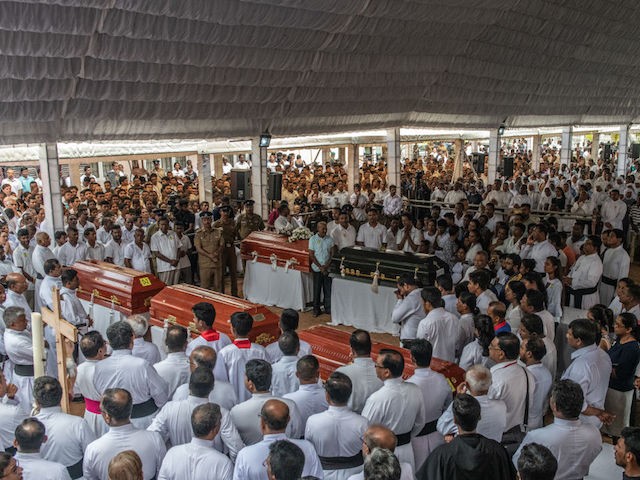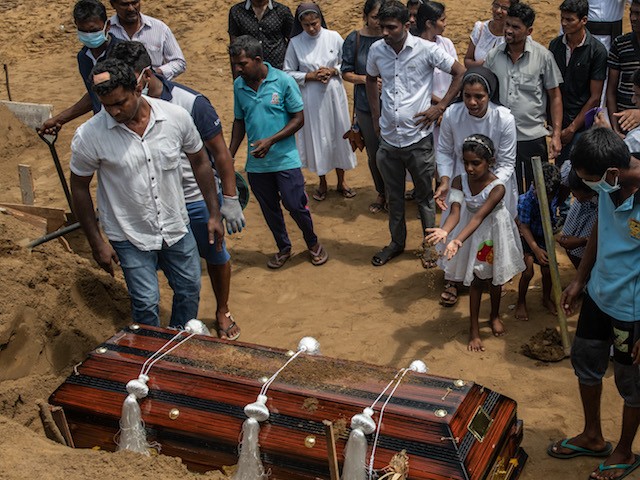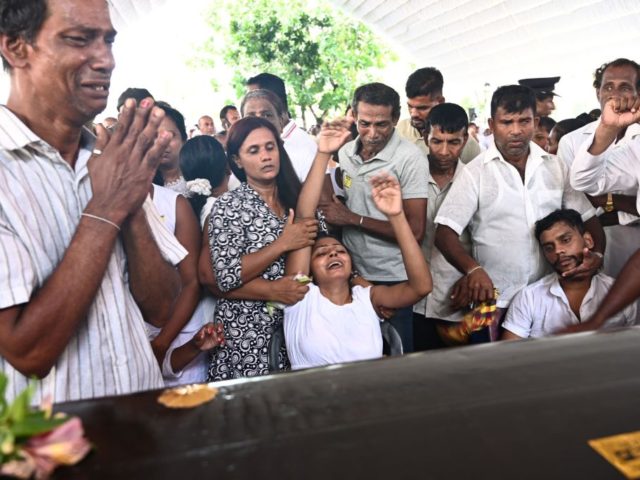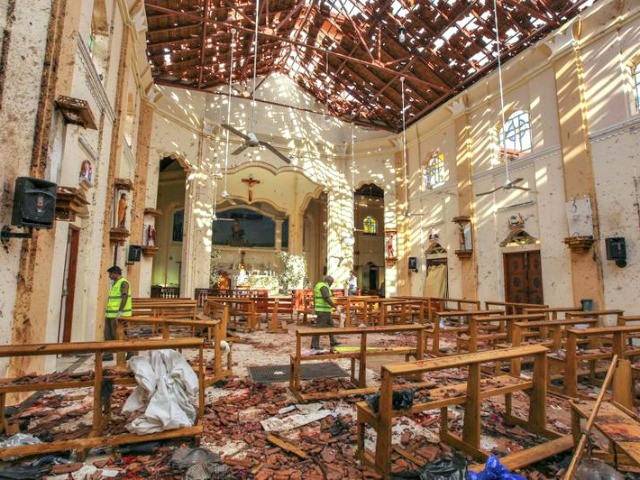Tuesday marked one year since the bombing of three churches and three hotels serving Easter brunch in Sri Lanka, claimed by Islamic State sympathizers and resulting in hundreds of deaths and severe injuries.
Sri Lanka observed its first Easter since the attacks on April 13. Given the current Chinese coronavirus pandemic, the government banned mourners and Christians nationwide from attending Easter services or congregating, urging them to observe the milestone in isolation.
On Tuesday, Sri Lanka continued to take measures to distance people physically as a way of slowing the spread of the virus. The nation observed the terrorist attack with a two-minute moment of silence at 8:45 a.m. when the first bombs detonated; the Archbishop of Colombo, the Sri Lankan capital, also offered words of hope to Christians seeking to move on from the horror they witnessed.
On Easter morning last year, six blasts occurred in the Colombo suburbs. At the three churches, suicide bombers made sure to detonate towards the back of the extremely crowded churches, which would result in more deaths and dismemberment of children. At the hotels, Christians gathered for early meals prior to worship and celebration similarly became victims of suicide blasts.

Friends, family, and members of the clergy attend a mass funeral at St Sebastian’s Church on April 23, 2019 in Negombo, Sri Lanka. (Carl Court/Getty Images)

A little girl throws earth on a coffin during the funeral of a person killed in the Easter Sunday attack on St. Sebastian’s Church, on April 24, 2019 in Negombo, Sri Lanka. (Carl Court/Getty Images)

A child looks at a grave after the funeral in Katuwapity village on April 23, 2019 in Negambo, Sri Lanka. (Atul Loke/Getty Images)
Initially, the Sri Lankan government’s death toll hovered around 350; authorities later revised that toll as many of the dead and wounded had lost so many parts of their bodies that some individuals were first identified as multiple people. The final death toll was over 250; another 500 were injured.
National Thowheed Jamath, a local jihadist organization, took responsibility for the event. Members of the group had pledged allegiance to late Islamic State “caliph” Abu Bakr al-Baghdadi.
Both Christians and Muslims are a minority in Sri Lanka, where the majority are Buddhists. A sizeable Hindu minority also lives in the country. Prior to the attack, the island nation had not received much attention as a potential jihadist hotspot.
Sri Lanka’s Daily Mirror observed the grim day on Tuesday by checking in on some of the survivors, including clergy who have endeavored to rebuild their congregations. Many, the newspaper noted, have struggled with chronic conditions such as pain, loss of limbs, or psychiatric issues. Many women and children who lost the male head of their household also lost their sole source of income, leaving them destitute. This week, the Chinese pandemic also took away any public event to address their suffering.
“The victims are in a desperate situation as they cannot pay due respect to their loved ones on the first year death remembrance, due to the current situation,” Fr. Lawrence Ramanayake, the director of the Christian charity Sethsarana, told the Mirror. “They cannot have a memorial service in church or go to the cemeteries. They are in a very pathetic situation right now.”
“The attack has worsened their problems, as some families lost their breadwinners. Some are living in rented houses, and others have loans to be settled,” he noted.
The Mirror highlighted the plight of one family who lost their father in the attack, George Chandrasegaran. Daughter Gloria George told the newspaper that she and her sister survived the bombing of St. Anthony’s Church, one of the six targets, because their father wrapped himself around them.
“In a moment everyone was gone, and as I got up, I saw everyone around me had died and there were body parts everywhere. Dada lay on the floor, and I though he was alive,” Gloria George narrated. “I called out to him, but he didn’t answer. I was trying to carry Dada and wanted people to help us, but nobody came. Instead they were taking videos.”
Gloria George told the newspaper that no one came to help them except for one man who stole the jewelry her dead father was wearing and the money out of his wallet. The thief stole from Chandrasegaran as the two girls, then 20 and 16, reportedly bled from their ears.
“We thought at last an angel had come, and we didn’t realise that we too had to go to hospital. Instead we went home as we were smelling of blood and there were body parts on our bodies. So we rushed home and had a bath, and later we got admitted to hospital as we were bleedings from our ears,” Gloria George said.
The Mirror also reached out to a man who experienced the reverse loss: the father of a family, Siran Anton lost his wife and daughter.
“My life is at a standstill and I have been at home ever since. I was employed at a garment factory, but I gave up my job because there’s no point earning money just for myself. There are a lot of issues, but I have no hopes on life,” he told the newspaper.
The government of President Maithripala Sirisena faced significant public outrage, including from the majority Buddhist population, after reports began circulating showing that Indian intelligence officials had warned their Sri Lankan counterparts about National Thowheed Jamath’s potential for violence. Sirisena, already in a power struggle with Prime Minister Ranil Wickremesinghe, claimed to have not received any such information and fired several security officials. His attorney general, Dappula De Livera, ordered their arrests, as well, but it was not enough to prevent an election loss later that year against current President Gotabaya Rajapaksa. Rajapaksa appointed his brother and Sirisena’s predecessor, Mahinda Rajapaksa, prime minister.
Archbishop of Colombo Cardinal Malcolm Ranjith addressed some of the cries for justice from the Christian community in his statement on Tuesday observing the anniversary.
“We are aggrieved that those responsible for governance at that time, did not take seriously the repeated warnings received concerning these attacks,” Ranjith said, according to Sri Lanka’s News First. “Some of them surely knew this was coming … What are human rights when they try to use such to cover up the perpetrators and associates of those who violated the basic right to life of so many innocent human beings?”
“We are hoping that we will be able to ascertain who orchestrated these attacks and who shirked their responsibility to prevent them and why,” Ranjith said.
Current Secretary of Defense Kamal Gunaratne vowed to improve upon the work of his predecessors.
“We will bring all those who involved in those bomb blasts, irrespective of their social status, political affiliations, ethnicity or religion to the book,” he assured on Tuesday. “We will not let our people die and suffer in such unfortunate incidents. We have taken all precautionary measures to identify such acts of terrorism or extremism at early stages and taken all necessary actions to bring them before the law.”


COMMENTS
Please let us know if you're having issues with commenting.